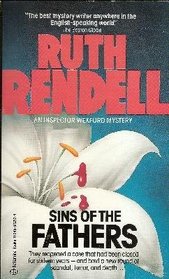Julie B. (juliebee) reviewed Sins of the Fathers (Chief Inspector Wexford, Bk 2) on + 33 more book reviews
Helpful Score: 1
I've recently been looking at catching myself up on reading some of the "classic mysteries". The first Ruth Rendell book wasn't bad, but by this second book, she really found her voice. Brilliant psychological examination that fooled me as to where it was going, right up until the very end. Loved it!
Second in the Inspector Wexford series, this book reveals Wexford, at times, from the point of view of others. He seems disheveled, cranky, obstinate. It takes a bit for us to glimpse the more thoughtful, introspective detective. I wonder if Rendell was still sharpening her perception of this character.
The Reverend Henry Archery visits Wexford, an old friend, to ask about a case from sixteen years back. Herbert Arthur Painter was convicted of a vicious murder and hanged. Wexford was a young detective then, and in charge of the case. He remembers it and he is just as sure these many years later that they got the right man.
Archery hopes to shake that certainty. Why? Because his son wants to marry Painter's daughter.
This novel takes place in the late 1960s, it appears, and many people believed then (and some do now) that certain traits were genetic. That, in this case, Painter's daughter might take after her old man. Might have criminal tendencies. This seemed silly to me, but it was taken seriously here.
The Rev was set on opposing the marriage if he found out for sure that the dear girl's father had in fact committed that murder years ago.
I was stuck thinking about the hanged man. If it should turn out that Wexford was wrong then, where does that leave him? In the real world, of course, this sort of thing happens. Would it happen here as well, and would Wexford forever after be haunted by it?
There is no official re-investigation, of course. But Wexford and underling Burden slice out bits of their days to look into the case again. Wexford remains convinced that he did not get it wrong but he is open to finding out more.
And more he does find out. More, perhaps, than most of us would guess. The secret investigation takes us into many different lives and parts of England, but it is worth it in the end.
A quick one to read, intriguing and as always full of interesting and absorbing characters.
The Reverend Henry Archery visits Wexford, an old friend, to ask about a case from sixteen years back. Herbert Arthur Painter was convicted of a vicious murder and hanged. Wexford was a young detective then, and in charge of the case. He remembers it and he is just as sure these many years later that they got the right man.
Archery hopes to shake that certainty. Why? Because his son wants to marry Painter's daughter.
This novel takes place in the late 1960s, it appears, and many people believed then (and some do now) that certain traits were genetic. That, in this case, Painter's daughter might take after her old man. Might have criminal tendencies. This seemed silly to me, but it was taken seriously here.
The Rev was set on opposing the marriage if he found out for sure that the dear girl's father had in fact committed that murder years ago.
I was stuck thinking about the hanged man. If it should turn out that Wexford was wrong then, where does that leave him? In the real world, of course, this sort of thing happens. Would it happen here as well, and would Wexford forever after be haunted by it?
There is no official re-investigation, of course. But Wexford and underling Burden slice out bits of their days to look into the case again. Wexford remains convinced that he did not get it wrong but he is open to finding out more.
And more he does find out. More, perhaps, than most of us would guess. The secret investigation takes us into many different lives and parts of England, but it is worth it in the end.
A quick one to read, intriguing and as always full of interesting and absorbing characters.
A Beautiful Blend
----------------------
This book blends Ruth Rendell's two styles beautifully -- the more straightforward, police detective style, with the sober Inspector Wexford; and the psychological exploration and extensive point-of-view writing she usually publishes as Barbara Vine. Terrific!
----------------------
This book blends Ruth Rendell's two styles beautifully -- the more straightforward, police detective style, with the sober Inspector Wexford; and the psychological exploration and extensive point-of-view writing she usually publishes as Barbara Vine. Terrific!
Ann C. (auntant) reviewed Sins of the Fathers (Chief Inspector Wexford, Bk 2) on + 103 more book reviews
Inspector Wexford is certain that the right man was executed for a vicious murder 16 years ago. But when the future father-in-law of the murderer's daughter begins his own investigation, Wexford must re-examine the case that won him a promotion and "made" his career. A fast-paced, excellent read.
Katt S. (Katt) reviewed Sins of the Fathers (Chief Inspector Wexford, Bk 2) on + 121 more book reviews
It was a brutal, vicious crime -- sixteen years old. A helpless old woman battered to death with an axe. Harry Painter hung for it, and Chief Inspector Wexford is certain they executed the right man. But Reverend Archery has doubts . . . because his son wants to marry the murderer's beautiful, brilliant daughter. He begins unravelling the past, only to discover that murder breeds murder -- and often conceals even deeper secrets . . .




